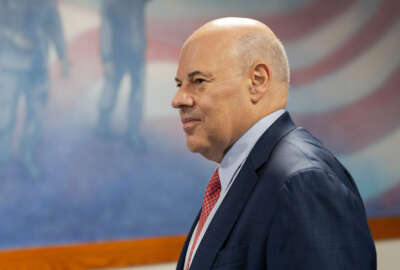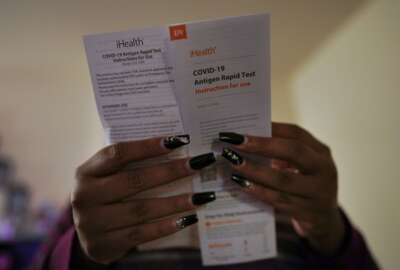Task force clarifies COVID-19 travel, leave policies for agencies
The Safer Federal Workforce task force releases first major update in almost three months on travel and masking guidelines.
Both new and updated COVID-19 policies from the Safer Federal Workforce task force center on official travel for employees and mask mandates for certain federal workers.
The travel, masking and leave policies, along with other guidance, are part of the first large-scale update in nearly three months from the task force, led by the White House, the General Services Administration and the Office of Personnel Management.
Although much of the June 3 update to the task force’s FAQ page elaborates on existing policies, a few changes have significant meaning for some groups of federal employees.
The task force clarified there are no governmentwide limits on official travel for federal employees, regardless of vaccination status. Although agencies determine their own travel policies, they are still required to ask employees about their vaccination status before confirming international travel, the task force said. Employees who aren’t fully vaccinated can still travel, but there are a few extra hurdles.
In particular, the task force said agencies should recommend that those employees get vaccinated, per Centers for Disease Control and Prevention guidelines, before their departure. Additionally, agencies must require unvaccinated employees to get tested for the virus no more than three days in advance of leaving for travel — at the agency’s expense.
When employees who aren’t fully vaccinated return from international travel, agencies shouldn’t let them enter a federal facility for at least five full days.
With more than 93% of the federal workforce vaccinated, those who are unvaccinated or partially vaccinated are a small minority.
But the policies for entering federal facilities apply more broadly. Agencies must require all federal employees, contractors and visitors to self-certify that they are fully vaccinated, or that they have had a negative test in the last three days, to enter a federal facility in counties with a medium or high COVID-19 transmission rate.
The task force also updated its vaccination certification form on May 27 for employees, contractors and visitors at federal facilities.
Agencies also have new guidance on how to handle close contact or confirmed cases of COVID-19 for employees on official travel. Previously, the task force barred employees from traveling for 10 days if they had come in contact with COVID-19.
That’s still the case, but there are rare exceptions. If an agency has an urgent, necessary and mission-critical need for an employee to travel, the individual may travel after just five days. But agencies should require the individual to get tested after any close contact with COVID-19, ensure there are no symptoms and wear a mask.
Agencies should also cover the cost of any recommended or required testing for employees who come in contact with COVID-19, the task force wrote.
Clarifying leave policies
In other updated guidance, the task force said employees can request to use sick leave, accrued annual leave or other types of paid time off if they have COVID-19 symptoms and are awaiting test results, or if they have a likely or confirmed COVID-19 case.
“Agencies may on a limited basis offer up to three days of administrative leave to employees who have COVID-19 symptoms and are isolating while actively seeking to be tested,” the task force wrote.
Agencies should require unvaccinated employees who suspect they have COVID-19 to quarantine after international travel. Vaccinated employees who don’t have symptoms may continue working without quarantining.
Additionally, the task force emphasized that unvaccinated employees in quarantine should continue teleworking whenever possible.
If telework isn’t possible, agencies can provide weather and safety leave — a type of paid administrative leave — for unvaccinated employees in quarantine awaiting results. If an employee is sick, though, the individual should use sick leave or another type of accrued leave.
“Agencies may ask employees for additional information if necessary to confirm that the employee has been notified of having had a close contact, including if the agency has reason to believe the employee has requested leave under false pretenses,” the task force wrote.
Masks required in some scenarios
There are specific instances where agencies should require employees to wear well-fitting masks. Those include employees operating government-owned vehicles, like aircraft, boats and buses.
Employees can remove their masks briefly to eat, drink or take medication, the task force said. The policy does not apply for outdoor areas or if there is only one person in the vehicle.
For government-operated vans, cars and trucks, agencies should recommend, but not require, wearing masks when there is more than one person in the vehicle.
In general, agencies should also post signs and online information about the exact masking requirements, depending on the policies of each federal facility, the task force said.
Large-scale events and task force exceptions
Along with traveling, agencies also have updated guidance on how to conduct in-person work events in specific instances. For example, agencies must get approval before hosting larger events in some areas.
“Should an agency intend to host a meeting, conference or event that will be attended in-person by more than 50 participants at a facility in a county where the COVID-19 community level is high, the agency would need to first seek the approval of its agency head or official to which this responsibility has been delegated,” the task force wrote (you can check any county’s community transmission levels at this website).
There is also new guidance for possible exceptions to the general COVID-19 guidance. The task force said it determines exceptions case-by-case.
“If agencies have implementation challenges or operational circumstances that may require other or additional prevention measures, agencies should consult the Safer Federal Workforce task force regarding exceptions,” the task force wrote.
The task force also said that for some local areas with stricter guidance than what the guidance states, agencies should follow the additional requirements.
“For example, if a locality has imposed mask-wearing requirements for indoor facilities, agencies would need to apply those requirements in federal facilities, even if not otherwise required under agency mask-wearing protocols,” the task force wrote.
Copyright © 2025 Federal News Network. All rights reserved. This website is not intended for users located within the European Economic Area.
Drew Friedman is a workforce, pay and benefits reporter for Federal News Network.
Follow @dfriedmanWFED






